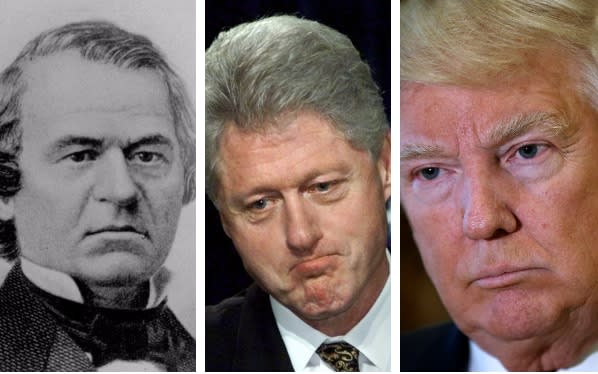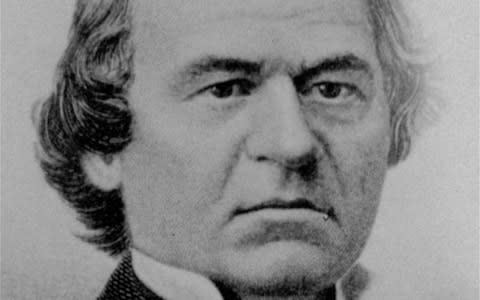What happens if Donald Trump is impeached – and who would be the next president?

Nancy Pelosi, the new Democratic speaker of the House, has announced impeachment proceedings will begin against Donald Trump.
Calls for the president's impeachment have been growing ever since allegations emerged that the US president asked FBI Director James Comey to end an investigation into links between Michael Flynn, former national security adviser, and Russia. The claim stemmed from a memo written by Mr Comey.
After the Democrats took control of the House in 2018, Mr Trump's administration has faced intense scrutiny and a slew of subpoenas and document requests of his Cabinet.
Mrs Pelosi initially ruled out impeaching Mr Trump, citing opinion polls showing the public were not on board. She would note the need for a bipartisan approach if impeachment is to have a chance of succeeding.
But the House Speaker has now changed her mind. On Tuesday, Mrs Pelosi said the trigger was claims that Mr Trump held back aid to Ukraine in the hope its leader would investigate Joe Biden, the former US vice president who is seeking the White House in 2020.
Here's a look at what needs to happen for Mr Trump to be impeached.
What is impeachment?
Impeachment is the process by which Congress puts certain officials, namely the president, on trial. The constitution lays out a broad scope of offences that can lead to impeachment: “Treason, bribery, or other high crimes and misdemeanors”.
It does not mean the president will necessarily be kicked out of office. It proceeds like a bill passing through legislature. First, a majority in the House of Representatives - 218 out of 435 members - must approve articles of impeachment previously approved in committee.

The previous make-up of the House favoured Mr Trump, with Republicans holding 238 seats while Democrats held 193. (Four seats were vacant.) That meant 25 Republicans would have had to be persuaded to vote to impeach Mr Trump - an unlikely scenario.
Now, however, the Democrats are in charge of the lower chamber after they gained the required 23 seats, giving them the simple House majority needed to start impeachment proceedings.
Then it goes to the Senate, where a two-thirds majority vote is needed to convict the president and consequently remove him from office.
Given the Republicans retained control - and even gained seats - in the Senate, it is highly unlikely Mr Trump would be convicted.
The Senate now has 53 Republicans, 45 Democrats and two independents who usually vote with the Democrats. Conviction and removal of a president would require 67 votes. So, for Mr Trump to be removed from office via impeachment, at least 20 Republicans and all the Democrats and independents would have to vote against him.
The Republican majority in the Senate could vote to immediately dismiss the charges against Mr Trump without considering evidence.
What does history tell us?
History books show impeachment is far from straightforward. There have been two presidents who have been impeached in the past and neither were removed from office.

Andrew Johnson was the first leader to go through the process in 1868. He was charged with breaking the law after he tried to replace the US secretary of war, Edwin Stanton, without congressional permission. At the time - in the aftermath of the civil war - the president was required to consult the Senate about such decisions. His impeachment passed to the Senate, where he escaped being removed from office by a one-vote margin.
The other president was, of course, Bill Clinton over the Monica Lewinsky scandal. He was impeached for perjury and obstruction of justice in 1998, but he was acquitted in the Senate trial.

Richard Nixon would almost certainly have faced impeachment proceedings in 1974 over the Watergate scandal and undoubtedly would have been removed from office. However, the disgraced president resigned before it got that far and he handed the presidency over to Gerald Ford.
What could Trump be charged with?
Many people have said Mr Trump is not fit to be president, but this is not an impeachable offence, even under the broad terms of the constitution. So what could he be charged with?
The founders of the United States created the office of the presidency and feared its powers could be abused. So they included in the US Constitution a procedure for removing a sitting president from office.
Under the Constitution, the president can be removed from office for "treason, bribery, or other high crimes and misdemeanors."
What exactly that means is unclear. Historically, it can encompass corruption and other abuses of the public's trust.
A president does not need to have violated a specific criminal law to have committed an impeachable offence.
Many legal commentators have said that pressuring a foreign leader to interfere in a US election is the sort of conduct the nation's founders would have considered an impeachable offence.
Who would be the next president?
If President Trump is impeached and removed from office, which at the moment is highly unlikely, Vice President Mike Pence would simply take over.

